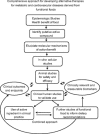Mechanisms for food polyphenols to ameliorate insulin resistance and endothelial dysfunction: therapeutic implications for diabetes and its cardiovascular complications
- PMID: 23900418
- PMCID: PMC4073986
- DOI: 10.1152/ajpendo.00377.2013
Mechanisms for food polyphenols to ameliorate insulin resistance and endothelial dysfunction: therapeutic implications for diabetes and its cardiovascular complications
Abstract
The rising epidemic of diabetes is a pressing issue in clinical medicine worldwide from both healthcare and economic perspectives. This is fueled by overwhelming increases in the incidence and prevalence of obesity. Obesity and diabetes are characterized by both insulin resistance and endothelial dysfunction that lead to substantial increases in cardiovascular morbidity and mortality. Reciprocal relationships between insulin resistance and endothelial dysfunction tightly link metabolic diseases including obesity and diabetes with their cardiovascular complications. Therefore, therapeutic approaches that target either insulin resistance or endothelial dysfunction alone are likely to simultaneously improve both metabolic and cardiovascular pathophysiology and disease outcomes. Moreover, combination therapies with agents targeting distinct mechanisms are likely to have additive or synergistic benefits. Conventional therapies for diabetes and its cardiovascular complications that are both safe and effective are insufficient to meet rising demand. Large, robust, epidemiologic studies demonstrate beneficial metabolic and cardiovascular health effects for many functional foods containing various polyphenols. However, precise molecular mechanisms of action for food polyphenols are largely unknown. Moreover, translation of these insights into effective clinical therapies has not been fully realized. Nevertheless, some functional foods are likely sources for safe and effective therapies and preventative strategies for metabolic diseases and their cardiovascular complications. In this review, we emphasize recent progress in elucidating molecular, cellular, and physiological actions of polyphenols from green tea (EGCG), cocoa (ECG), and citrus fruits (hesperedin) that are related to improving metabolic and cardiovascular pathophysiology. We also discuss a rigorous comprehensive approach to studying functional foods that is essential for developing novel, effective, and safe medications derived from functional foods that will complement existing conventional drugs.
Keywords: endothelial dysfunction; functional foods; insulin resistance; polyphenols.
Figures
References
-
- Akiyama S, Katsumata S, Suzuki K, Nakaya Y, Ishimi Y, Uehara M. Hypoglycemic and hypolipidemic effects of hesperidin and cyclodextrin-clathrated hesperetin in Goto-Kakizaki rats with type 2 diabetes. Biosci Biotechnol Biochem 73: 2779–2782, 2009 - PubMed
-
- Bogdanski P, Suliburska J, Szulinska M, Stepien M, Pupek-Musialik D, Jablecka A. Green tea extract reduces blood pressure, inflammatory biomarkers, and oxidative stress and improves parameters associated with insulin resistance in obese, hypertensive patients. Nutr Res 32: 421–427, 2012 - PubMed
Publication types
MeSH terms
Substances
Grants and funding
LinkOut - more resources
Full Text Sources
Other Literature Sources
Medical


